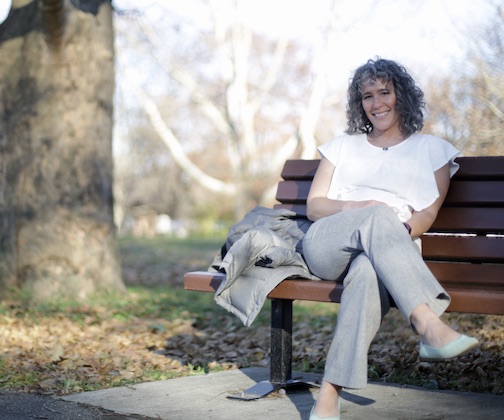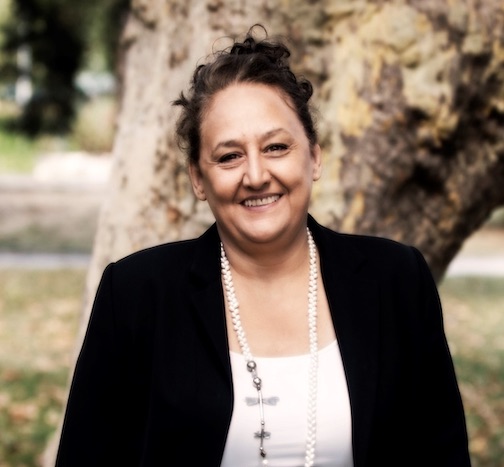I was in sixth grade when I got braces. The orthodontist told my parents that even though my teeth were straight, my jaw was misaligned and I would be vulnerable to terrible headaches throughout my life if we didnt do something about it now. Soon enough my teeth were covered in railroad tracks and I didnt want to smile. I went to the orthodontist once a month and he adjusted the wires so that the braces cinched tighter each time, and after each visit I went to bed wanting to cry. Achy mouth. It felt like the braces would never go away.
A year in, I was fitted with a headgear to wear at night. It was meant to do even more heavy lifting in terms of teeth movement than the railroad tracks had yet accomplished. The first night with that headgear, it seemed as though all the pressure in the world had wrapped itself around my head. It seemed as though something was tugging at the very center of me and forcing it to move. That night I really did go to bed crying. The next night felt the same, and the night after did as well, and I thought, okay, here it is: a planned life of pain has begun and will continue and this is just how things are supposed to be. I didnt tell anyone. My jaw, my head, my neck: they throbbed constantly.
At my next checkup, a month later, it turned out that the orthodontist had accidentally fit the headgear too tight, and it had done in a month what it should have taken a year to accomplish. I got my braces off early. This happened during the summer, and when I started back up at school in the fall, my teachers told me they were glad my smile was back.
Temperomandibular joint syndrome, which most people just call TMJ, is when the joint that connects your jaw to your skull becomes misaligned. Teeth grinding can cause it. Jaw clenching can cause it. A punch to the jaw can cause it. The cartilage degeneration that occurs with arthritis or as a normal part of aging can cause it. Its effects can include headaches, neck pain, pain in the face muscles, jaws locked open, ringing in the ears, loud clicking noises when the jaw goes through its regular motions.
I met my husband when I was twenty-four. We've been married now for twenty-one years. When my jaw catches when Im trying to say something and I have to stop to readjust it, he looks at me with sympathy and asks if there's anything he can do. Sometimes he runs his hand over my cheek and says, poor jaw. Theres nothing he can do, though I appreciate the comfort of his hand.
A few years ago a masseuse suggested tongue stretches to loosen things up. They mostly involved variations on curling my tongue backward and pressing it against the roof of my mouth. Some required that my mouth be open slightly. Some required that my mouth stay firmly shut. When I told my dental hygienist about the stretches, she was appalled. You don't want to loosen things up too much, she said. Theres a reason your jaw is so tight. I think she meant that there's a reason we clench up to protect vulnerabilities inside us, or that sometimes we use pain of one sort to protect ourselves from greater pain of another sort. Actually, she's no longer my dental hygienist. I switched a few years ago after she recommended that I put ice cream in my children's oatmeal. My children have never had a problem eating oatmeal just the way I make it. Why keep working with someone who sees problems where none exist and who cautions holding onto a problem out of worry for something worse?
My jaw is worst when I eat. Sometimes, before taking a bite, I use my hands to move it so it doesn't catch and click. Crusty bread makes it click louder than anything else. Mostly I just try not to eat it. Sometimes, when I'm sitting alone reading, I open my mouth to the point where my jaw pops and hope that by some miracle that pop will clear the issue up forever. Instead, over and over I go through panicked moments of imagining I'll never be able to get my jaw shut again.
My husband told me not too long ago that he had a real crisis early on in our relationship. He was pretty smitten with me, but every time we ate together he heard a loud popping sound. My jaw. It turned his stomach, that sound of bone rubbing against bone. He didnt know if he could continue breaking bread with me. How could we live together if we couldn't eat together? What hope was there for us? He got over it eventually. And now, over twenty years later, we still have each other in our lives.
Some things stay with you for life. They happen, and you have no idea that theyll stick with you, and then all of a sudden it's a lifetime later and you're still doing the same thing. I have clothes in my closet from twenty years ago that I havent worn in twenty years, and that I still can't bring myself to donate to Goodwill. I have lines from poems learned in eighth grade that I suspect will never unwrap themselves from my brain. I have a jaw that pops and gives me pain and that makes me reluctant to eat around strangers and that there is no cure for and that I blame on my orthodontist and that stupid, over tightened headgear, but which might have nothing to do with them at all. But not all the things that stick with us are bad: take my husband for example. When I first met him, I didn't expect to date him, let alone marry him, let alone have two children with him, let alone still be in love with him twenty-one years later. And yet here we are, and what would life be without him? Maybe the orthodontist knew exactly what he was doing, painful headgear and all, and if I hadn't had the braces and the headgear, I'd be battling chronic headaches instead of a perpetually achy jaw. We just can't know about the past, much as wed like to, just like we just can't predict what will stay with us in the future though we may spend our whole lifetime trying.
More Stories from Kinnected

At times, it has been really frustrating to be a strategist and health communication professional and witness the lack of strategic planning and messaging that we have over the last two years.
-
3 years ago

"What many people miss is that emotional exhaustion among clinicians existed long before the pandemic."
-
4 years ago

"A lot of people argue whether technology is good for the future of humanity or bad. In my opinion, it is both - just as an herb could be a poison or a medicine."
-
4 years ago

